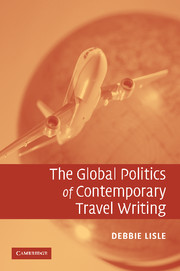Book contents
- Frontmatter
- Contents
- List of illustrations
- Preface
- ‘Travelogue’
- 1 Introduction: the global imaginary of contemporary travel writing
- 2 Between fact and fiction: the generic boundaries of travel writing
- 3 The cosmopolitan gaze: rearticulations of modern subjectivity
- 4 Civilising territory: geographies of safety and danger
- 5 Looking back: utopia, nostalgia and the myth of historical progress
- 6 Engaging the political: contemporary travel writing and the ethics of difference
- Bibliography
- Index
6 - Engaging the political: contemporary travel writing and the ethics of difference
Published online by Cambridge University Press: 22 September 2009
- Frontmatter
- Contents
- List of illustrations
- Preface
- ‘Travelogue’
- 1 Introduction: the global imaginary of contemporary travel writing
- 2 Between fact and fiction: the generic boundaries of travel writing
- 3 The cosmopolitan gaze: rearticulations of modern subjectivity
- 4 Civilising territory: geographies of safety and danger
- 5 Looking back: utopia, nostalgia and the myth of historical progress
- 6 Engaging the political: contemporary travel writing and the ethics of difference
- Bibliography
- Index
Summary
The Global Soul may see so many sides of every question that he never settles on a firm conviction; he may grow so used to giving back a different self according to his environment that he loses sight of who he is when nobody's around. Even the most basic questions have to be answered by him alone, and when, on the planes where he may make his home, the cabin attendant passes down the aisle with disembarkation forms, it may be difficult for him to fill in any of the boxes: ‘Home Address’, ‘Citizenship’, ‘Purpose of Visit’, even ‘Marital Status’. I can answer almost any of these from a variety of perspectives… But though this can be a natural – and useful – enough impulse in response to the question ‘Where do you come from?’ it becomes more treacherous in answer to the question ‘Where do you stand?’
Pico IyerIyer's own experience of the relationship between authority and hybridity exemplifies one of the main political tensions of this book: on the one hand, there are sovereign structures of power that require loyalty, homogeneity and single-mindedness (e.g. the apparatus of Customs and Immigration), and on the other hand, there are cosmopolitan forms of identity and community that transcend these exclusionary structures (e.g. global souls, travel writers). For me, those opposing formations are best understood as either colonial visions that rely on the resuscitated power relations of Empire, or cosmopolitan visions that seek to transcend the legacy of Empire through multiculturalism, tolerance and respect for cultural difference.
- Type
- Chapter
- Information
- The Global Politics of Contemporary Travel Writing , pp. 260 - 278Publisher: Cambridge University PressPrint publication year: 2006



